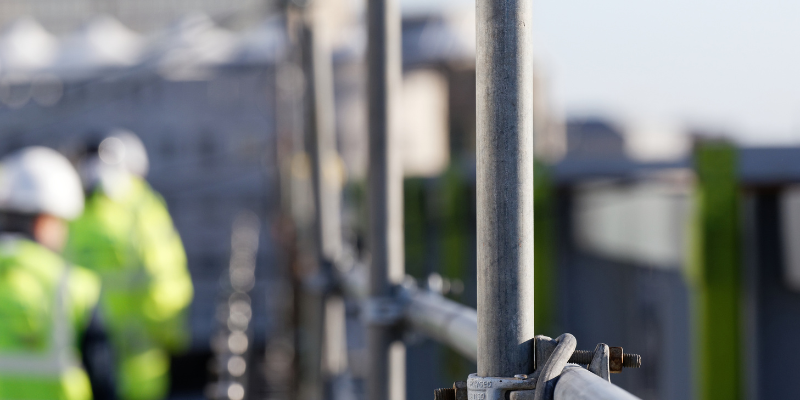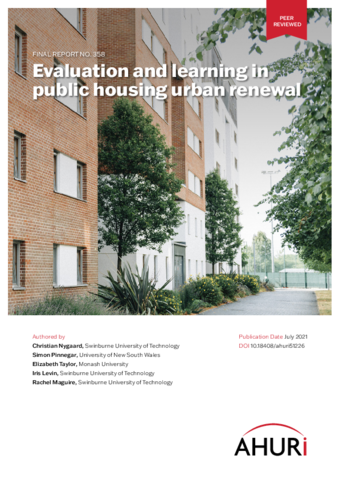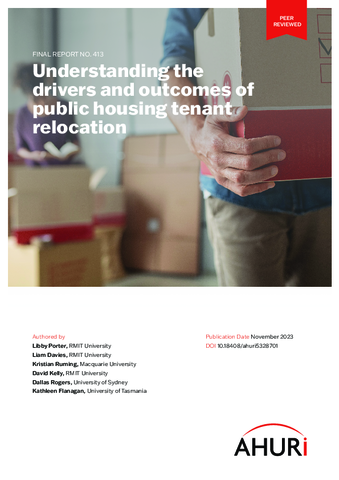What is social housing renewal?
Social housing renewal is more than just fixing up old homes. It happens when old social housing estates and large building complexes are knocked down. They are replaced with new, modern homes. These new homes have benefits for social housing tenants and governments.
What are the benefits of social housing renewal?
Benefits for social housing tenants include:
- better quality homes with improved heating, cooling and accessibility
- housing options that better match tenant needs, such as more one and two bedroom units or, more rarely, larger apartments for bigger families to reduce overcrowding
- mixed communities, which means having homeowners, private renters and social housing tenants living near each other. Reducing the concentration of social housing in an area could reduce area-based stigma.
Benefits for governments include:
- more social housing homes (though not necessarily housing more people)
- developing government land to its full value
- lower future maintenance costs
- bringing social housing stock into line with current building codes
- keeping social housing in areas that have risen in property value
- improving the area’s amenity
- increased density in existing urban areas makes it more efficient for governments to provide services.
When should social housing be renewed?
The timing of social housing renewals needs careful planning. If done too soon, housing agencies risk relocating tenants too early from a home where they are happy living. If done too late, housing quality may worsen to levels that cannot be lived in.
What makes a home 'unliveable' can be different for different people. Research has found that 'where some people see dilapidated, unhealthy, antisocial buildings that should be knocked down, others see homes, communities and opportunities for renovation and refurbishment.'
While all houses need repair, the cost of fixing any single home doesn't usually trigger large-scale social housing renewal. Renewal decisions usually consider the overall quality of social housing in the local area, as well as a wide range of other factors.
Social housing renewal often happens when the land value of poor-quality social housing is high enough to make it worthwhile knocking down and building higher density housing. This increases neighbourhood density and, if some new homes are sold privately, allows the government to get income to help fund renewal. This money may help increase social housing supply more broadly.
What is the impact of social housing renewal on tenants?
During renewal, existing tenants must move out of their homes. They may end up living for long periods far from their community connections.
Evaluations show this is difficult for some tenants. Tenants can experience:
- reduced social connections
- loss of socio-economic and cultural diversity in the wider neighbourhood
- reduced involvement in decision-making during redevelopment
- negative impacts for local services and businesses
- breakup of existing community networks as only around 20% of public housing residents return after being relocated
- limited or poor interaction between public and private residents.
How can social housing renewal be done 'well' for tenants?
While governments need to manage renewal costs, developments should benefit existing tenants as well as increase the supply of housing for people on social housing waiting lists.
Doing renewal 'well' means keeping tenants fully informed in a timely and honest manner. This information should be given to tenants well before any wider public announcements about the redevelopment of their homes. Well-trained Relocation Officers, as part of the housing agency supplying the social housing, then work with tenants to navigate the problems that arise during the renewal process and help them get the best outcomes possible.
AHURI research found that for existing tenants 'clearer management and communication arrangements between renewal and relocation teams is needed early. The time required to relocate tenants should inform the staging of the renewal process, not the other way around.'
Tenants also need real choices about where they will be moved to. Housing agencies should offer tenants the option to return when redevelopment is complete. But since only about 20% of tenants typically choose to return, many will stay in their new homes permanently.
With long waiting lists for social housing across Australia, moving existing tenants during development can worsen housing shortages. Housing agencies need enough stock to meet increased demand from relocations. Where possible, renewal developments should be staged to reduce displacing tenants from the local area. Instead, tenants should be moved into new housing in the development as it is completed.



